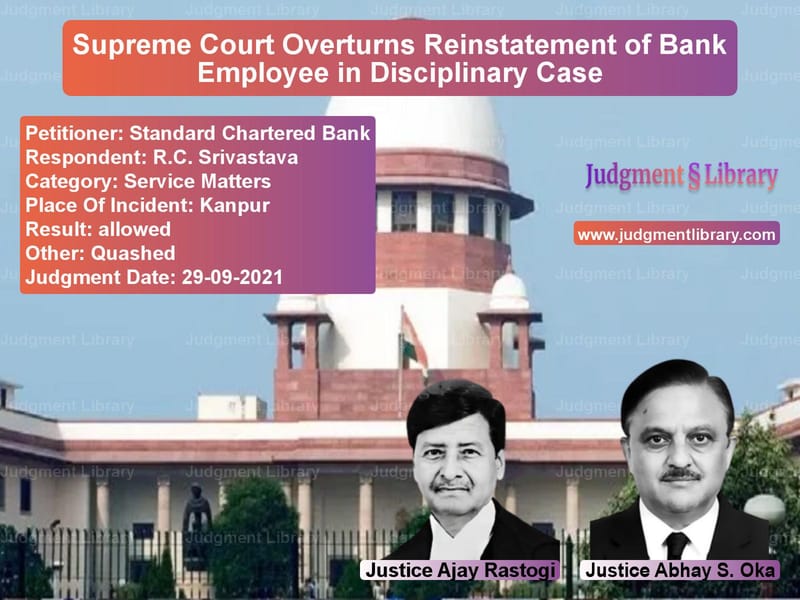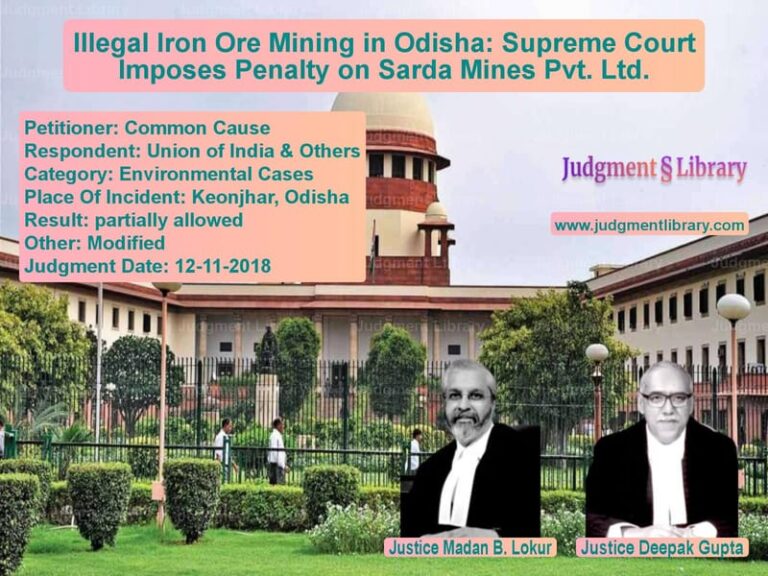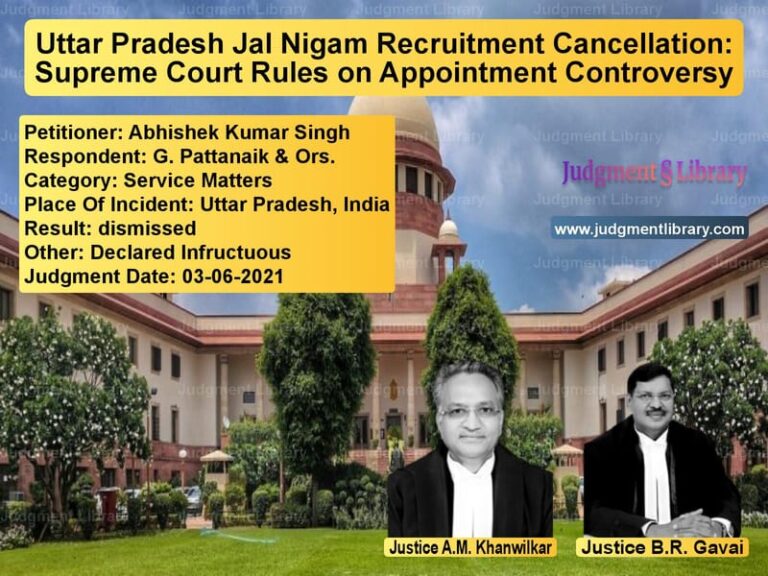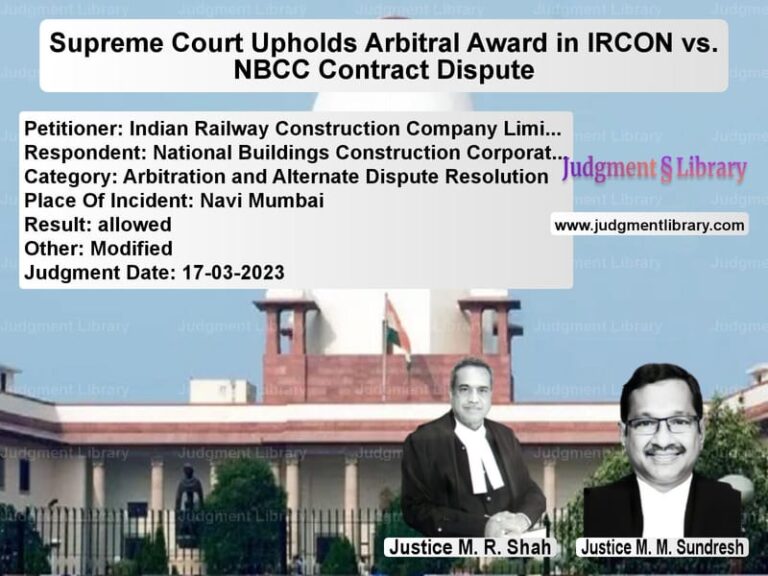Supreme Court Overturns Reinstatement of Bank Employee in Disciplinary Case
The Supreme Court of India recently delivered a significant judgment in the case of Standard Chartered Bank vs. R.C. Srivastava. This case revolved around the dismissal of an employee on charges of misconduct and whether the Labor Tribunal and High Court were justified in ordering his reinstatement with full back wages. The Supreme Court ultimately ruled in favor of the bank, setting aside the previous orders and upholding the dismissal.
Background of the Case
The case dates back to an incident on January 12, 1988, when the respondent, R.C. Srivastava, was accused of engaging in disorderly conduct within the premises of Standard Chartered Bank (then ANZ Grindlays Bank Plc). The charges included:
- Being in an inebriated state on the bank’s premises.
- Assaulting and manhandling a senior officer.
- Hurling abuses and using offensive language against the bank’s management.
Following this incident, Srivastava was issued a charge sheet on January 27, 1988, and a departmental inquiry was initiated.
Findings of the Departmental Inquiry
The bank conducted an internal inquiry as per the Bipartite Settlement of 1966. The inquiry found Srivastava guilty of gross misconduct under Clause 19.5 (c) and (d), which pertain to:
- Drunkenness, riotous, disorderly, or indecent behavior on the premises.
- Acts prejudicial to the interest of the bank.
Based on the findings, the disciplinary authority dismissed Srivastava from service on August 22, 1991.
Legal Battle and Tribunal’s Decision
After his dismissal, Srivastava challenged the decision before the Industrial Tribunal. The Tribunal:
- Examined the records of the departmental inquiry.
- Found the inquiry to be fair and proper.
- However, revisited the evidence and concluded that the charges against Srivastava were not adequately proven.
- Ordered his reinstatement with full back wages, seniority, and consequential benefits through its award on September 14, 2006.
High Court’s Ruling
Aggrieved by the Tribunal’s order, the bank approached the Allahabad High Court. The High Court, through its judgment dated November 21, 2014, upheld the Tribunal’s decision, reaffirming Srivastava’s reinstatement.
Supreme Court’s Analysis and Judgment
The Supreme Court examined the case in detail and made several key observations:
1. Limited Scope of Judicial Review in Domestic Inquiries
The Court reiterated that judicial review in disciplinary matters should be limited. It stated:
“The scope of judicial review in the matter of domestic inquiry is to examine whether the procedure in holding the inquiry has been violated or if the principles of natural justice have been complied with.”
In this case, the inquiry was found to be fair and proper.
2. Tribunal Acted Beyond Its Jurisdiction
The Supreme Court criticized the Tribunal for acting as an appellate authority rather than exercising judicial review. It noted:
“The Tribunal converted itself into a Court of Appeal, revisited the evidence, and disregarded the testimony of key management witnesses.”
The Court emphasized that once an inquiry is found to be fair, interference should be minimal unless there is a clear case of perversity.
3. Evidence Supported the Dismissal
The Court found that the testimonies of three key witnesses—Mr. P.K. Seth, Mr. B.M. Sikka, and Mr. Arun Sharma—corroborated the allegations against Srivastava. It stated:
“The management witnesses clearly stated that the respondent was in a drunken state, used abusive language, and assaulted a senior officer.”
4. Preponderance of Probability vs. Beyond Reasonable Doubt
The Supreme Court reiterated that domestic inquiries are based on the principle of preponderance of probabilities, unlike criminal cases which require proof beyond reasonable doubt.
“The Tribunal misapplied the criminal standard of proof, thereby committing a grave error in law.”
5. High Court’s Error
The Supreme Court also faulted the High Court for failing to appreciate the Tribunal’s overreach. It held:
“The High Court dismissed the writ petition without appreciating the perverse approach adopted by the Tribunal.”
Final Decision
Based on the above findings, the Supreme Court:
- Set aside the High Court’s judgment dated November 21, 2014.
- Reversed the Tribunal’s award dated September 14, 2006.
- Upheld the bank’s decision to dismiss Srivastava from service.
- Ruled that no recovery shall be made from the payments made to Srivastava in the interim period.
Conclusion
The Supreme Court’s judgment reaffirms the principles of judicial restraint in disciplinary matters. It highlights that once an inquiry is found to be fair, courts should not act as appellate bodies and reassess evidence. The ruling is a significant precedent in labor law, ensuring that employers’ disciplinary decisions, when made fairly, are upheld without undue interference.
Petitioner Name: Standard Chartered Bank.Respondent Name: R.C. Srivastava.Judgment By: Justice Ajay Rastogi, Justice Abhay S. Oka.Place Of Incident: Kanpur.Judgment Date: 29-09-2021.
Don’t miss out on the full details! Download the complete judgment in PDF format below and gain valuable insights instantly!
Download Judgment: standard-chartered-b-vs-r.c.-srivastava-supreme-court-of-india-judgment-dated-29-09-2021.pdf
Directly Download Judgment: Directly download this Judgment
See all petitions in Disciplinary Proceedings
See all petitions in Employment Disputes
See all petitions in Termination Cases
See all petitions in Public Sector Employees
See all petitions in Judgment by Ajay Rastogi
See all petitions in Judgment by Abhay S. Oka
See all petitions in allowed
See all petitions in Quashed
See all petitions in supreme court of India judgments September 2021
See all petitions in 2021 judgments
See all posts in Service Matters Category
See all allowed petitions in Service Matters Category
See all Dismissed petitions in Service Matters Category
See all partially allowed petitions in Service Matters Category







